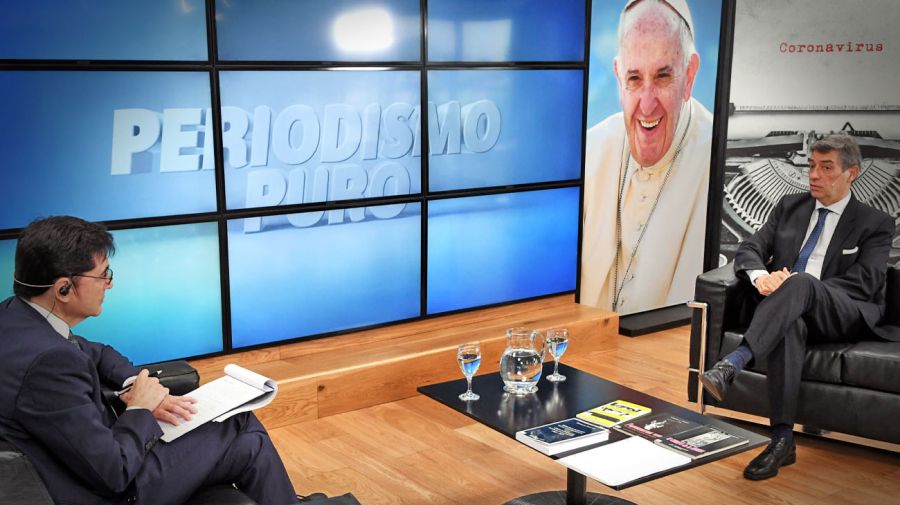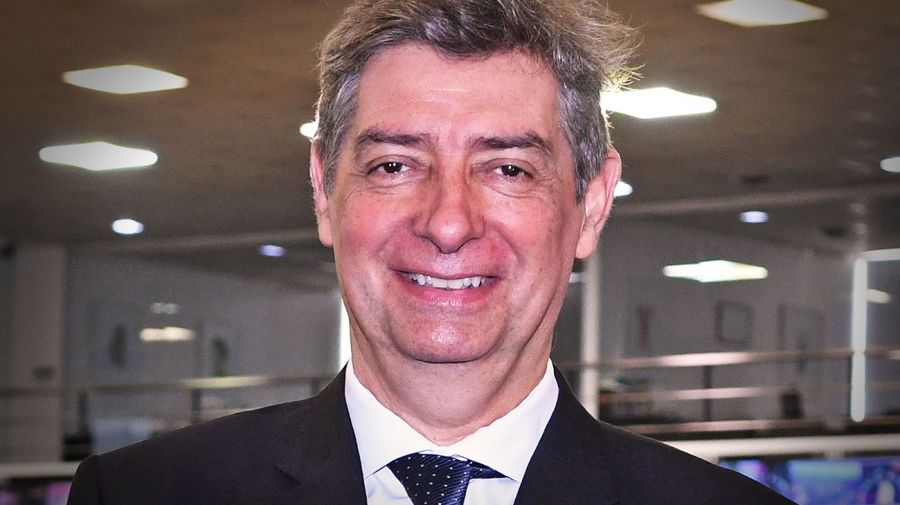In his first interview since becoming Supreme Court chief justice and just days after the nation’s highest tribunal was criticised by Argentina’s Justice minister, Horacio Rosatti, 65, responded to questions about the judicial cycle and his principles for over two hours.
On your web page, juezrosatti.com.ar, you can see the classic representation of justice, in which the Greek goddess Themis bears a scale in one hand and a sword in the other. How much of the sword and how much of the scale does a Supreme Court chief justice need?
A good deal of both. The Court is a supreme power, symbolised by the sword. The Judiciary is a power, not just a balance of power. We don’t have some occult mandate from society legitimising us to oppose what we don’t like. We have the power to declare laws unconstitutional and to regulate what the other branches of government do. In those points we need to proceed with balance and prudence.
It’s difficult. One often goes signing a ruling with conviction and at the same time asking oneself if justice will be done. In the Supreme Court we do not see the case, the people, the witnesses or the evidence – we’re in front of a dossier. We’re a court of courts, not of cases. A calm conscience comes from having acted true to one’s criteria if you really rule that what’s right is right in the right direction but one is often left with doubts.
Does that cause you anguish, over and above the ruling?
That doesn’t cause me any anguish, I actually enjoy it. There are people who suffer in public office, especially if it has great relevance. I go to work every day happily. For a professor of constitutional law, having been a Constituent Assembly delegate contributing to reforming the Constitution of my country and now being Supreme Court chief justice are dreams come true.
How much of a politician and how much of a lawyer does a Supreme Court chief justice need to be?
It shouldn’t be forgotten that we are a court but different from the others since we head a branch of government, while the chief justice has different responsibilities from the other justices, needing to measure carefully when he talks and with whom.
I give very few interviews. I must talk when I have something to say, if not, I shouldn’t. That old saw about a judge speaking only via his rulings was beyond discussion until around 1970 or 1980 but now it’s debatable. I don’t believe in media-driven courts. Our strength is our rulings. Even so, every now and then you have to say something – speaking out to explain when we see something wrong with ourselves.
We should try and make the rulings self-explanatory with clear language which people can understand so that we do not have to go out to explain them but you do need to explain the context and situation.
Some journalists are said to be “judicial operators.” Has that been your experience?
My relationship with journalists is both distant and respectful at the same time. I never have anything to say about press opinions, even when holding posts of great public exposure, like being mayor [of Santa Fe]. I try to keep out of it.
If I may be allowed an impertinent question, when you were in line to become chief justice, an article published in Letra P said: “His detractors single him out as the candidate of Clarín and La Nación, two media companies with a stake in the Supreme Court, distinguishing him from [former chief justice Ricardo] Lorenzetti, the historic ally of Infobae. Supporters of Vice-President Cristina [Fernández de] Kirchner attribute to Rosatti, who entered the Supreme Court after a lifelong career in Peronism, contacts with Jorge Rendo, [Grupo Clarín CEO] Héctor Magnetto’s ambassador for legal affairs.” How much fiction is there in all that?
Every single bit of it. The editorial line of any media is generally known. You know that some rulings are going to please and others displease those media. In human terms, the important thing is not to believe that you’re the best judge in the world because you’re praised nor the worst because you are criticised. One realises what repercussion a ruling is going to have. What guarantees us a calm conscience is looking at the Constitution and knowing where the criticism and the praise come from. You should not give credence to the praise but you must take heed of the criticism because it might be well grounded. You know when the praise ties in with media interests. I do not have any direct or permanent communication with media owners – that is simply not true.
What should the golden mean of contact with the political authorities, with the President and Congress be?
I believe in dialogue between the branches of government, that doesn’t scare me. I don’t buy that there is any witch-hunting in that regard. As long as it is an institutional dialogue, I have no problem, it’s healthy.
They are three different branches but of the same state. We owe it to the community. The judge will always be on guard against being asked about a case. Private meetings always exist. Sharing a drink at the anniversary of a magazine, somebody comes along and you sum up a dossier for them in 30 seconds. It happens a lot. But I do not see institutional dialogue as a cause of scandal in any way.
There are also journalists who speak of “the independent republic on the fifth floor,” over and above this being a metaphor for criticism or mockery. What is really the power of the Supreme Court within governance? Is it at the same level as the other branches of government?
Yes, they have to be at the same level. In the consolidated democracies of the world, the Supreme Court is at the same level. Judges have a more silent role, saying little and only on issues within their jurisdiction. They do not refer to the performance of the other powers. Among other roles, the Court, as the country’s supreme tribunal, must control the other branches of government without that control being abusive or making the citizenry’s rights more vulnerable. It is a substantial role.
Argentine society has mixed feelings about the court system. It criticises the way it works a lot but appeals to it often, thus continuing to think that many conflicts should reach the Supreme Court as a last resort for defending their rights, over and above the criticisms. A very profound explanation is that Argentine society has long been unable to settle its conflicts without taking them to court. It is a more conflictive world but those conflicts are increasingly taken to court. We have a radical incapacity to resolve problems out of court. There is a lack of concord, tolerance and understanding. Everything has to be settled in court. That is cause for reflection. Then come the court rulings, of course. If as a society we cannot resolve some of our conflicts on the basis of good faith, understanding, concord and solidarity, they will end up in court.
One of your publications is entitled Progresividad y operatividad de los derechos económicos, sociales y culturales en una sociedad en conflicto. How can the law contribute to creating equality?
That’s complex. Many situations imply opting for a right. We see that in conflictive societies all the time. The rights to honour and the freedom of expression sometimes collide. Ditto with property rights and equal redistribution. What weight to give them permanently requires judgement because all those rights are in the Constitution. The Constitution speaks of the right to property, equality, freedom of expression and also the right to honour. It’s not simple. While conforming to what the Constitution says, one must have a progressive outlook. I’ve sometimes been said to be a capitalist judge.
By Mauricio Macri?
An ex-president who, without meaning to, gave me the greatest praise in over five years in the Supreme Court. He said: “I proposed him and then he voted against me.” Just a month later, in a ruling on public utility billing, I voted against the government’s thinking. The praise implied that I was an independent judge. I don’t know if it was his intention to praise me but I really thank him.
Regarding anti-capitalism, property rights are in the Constitution and we respect them. But Article 75, subsection 19 of the Constitution speaks of social justice. Redistribution is the Constitution on the basis of respect for property rights. The Constitution adopts a system which trusts in capitalism as the main or best way of accumulating wealth while the state until now is the best or least bad means of redistributing it.
You said: “One example of this problematic relationship would be verifying the right to access to decent housing when it is recognised constitutionally while far from being a concrete reality.” How do you link dialectically the creation of rights with the real possibility of their being exercised?
In Latin American countries we have a tendency to recognise rights. That is correct but you also need to see the framework of possibilities for effectively enjoying those rights. In some cases the barriers are cultural and in others, economic.
We have a problem there. We have one now, we had it five years ago and we’ll have it 10 years down the road tomorrow. When we ruled in favour of the pensioners, it caused a great controversy. Even if a ruling only hikes pensions by 10 pesos, every ruling has a very important potential expansion in budget terms. In those cases it is said that we are planting a bomb against the government. No, we are complying with the Constitution. If the claim arrives, that is because it was preceded by failure all along the line. These rulings in favour of pension mark-ups are a Supreme Court line. We end up being seen as the villains of the film but that is something in the Constitution. How vulnerable people are treated defines a society.
In many countries of the world they speak of the need for a wealth tax, while in Argentina it acquired the format of a voluntary contribution as a means of arriving at social justice.
I cannot go into that too much because it’s a case we’re going to have to resolve. But in general the Supreme Court says that this tension must be resolved by the political world within constitutional parameters. We control that taxation within the four constitutional parameters of being reasonable, egalitarian, legal and not confiscatory. In each concrete case you have to see to what level they are affected.

Is there another conflict between not being regressive and being progressive?
Yes, when there are economic crises. Being progressive means that I am never going to turn back. The law recognises that once I have reached a certain point, I can only move ahead but never back. Then an economic crisis comes along with the result that they want to pull back my bank deposit, my savings, and the contracted interest rates. Pension updating functions something like that.
You point out: “There are two possible criteria for evaluating the work of the Supreme Court: a) the quantitative volume of the causes to be resolved; b) the participation of its justices in defining decisions.” What evaluation would you make of those two criteria in these last five years when you have been a justice?
The Supreme Court averages 15,000 to 30,000 cases annually. When pensions are hiked, the cases rise exponentially. In recent years the Court has annually resolved between 10,000 and 30,000 cases, with or without pandemic, via an annual average of 7,000 rulings. We sign 150 to 200 rulings every week.
Or around 20 everyday. You wouldn’t have time to read them.
When a case is rejected, it’s because it was studied beforehand. Nothing is random and everything must be studied. That’s different from not ruling or voting subsequently. That’s around half the cases, depending on the year. We have people who tell us about the cases and we act on dossiers.
You said that in a week the Supreme Court resolves as many cases as other levels of jurisdiction in a year.
We’d like to resolve only 100 cases per year. We have our agenda for next year. We are thinking of our court colleagues. We’d like to say that we will be treating euthanasia, freedom of expression, assisted fertilisation, property rights in any context and those of the indigenous peoples – the big issues. But we’re told that we have to resolve more cases because there is a backlog and that they would be resolved with more members. False. The more justices we have in the Supreme Court, the more time during which the file must circulate, implying greater slowness. They say we should split up into units with each one having its own specialisation, naming 15 justices for five units with three justices each. But first and foremost comes the debate over whether the matter in question is constitutional or not. The lawyers complain saying that we reject many cases under Article 280. Do you think that they would be satisfied with a unit ruling or would they demand a plenary session? With that system there would simply be a further instance, even slower again.
When people speak of reforms, they should say what kind of Supreme Court they want and then the strategies conducive to the aim they seek. It’s evident that this is not happening and that they’re talking off the cuff. One must be very serious about this. Can you imagine what the bar associations, the lawyers and the litigants would say if we really decided to resolve 100 cases and not 15,000? They would condemn us. There is a tension which will have to be resolved. There are ways of doing that.
Firstly, it should be understood that the Supreme Court is no ordinary instance – it’s extraordinary and not everything can go there. The problem is not so much what comes out as that more water enters into the boot than we can bail out. The cassation courts would have to get married and unify their jurisprudence. It must be understood that when the Supreme Court rules on an issue and systematically reiterates it, nobody should come back to us with the same case, least of all the state. The state keeps coming back with always the same appeals against pension rulings, knowing that they are going to lose. They do so in order to gain time. A few weeks ago we issued the ‘Vidal ruling,’ which has to do with the application of the most benign criminal law in tax cases. I celebrate that the AFIP tax bureau and the Attorney-General’s office both said: “The Supreme Court has pronounced in the Vidal case, we’re not going to appeal such cases any more.” That seemed very healthy to me. Since in our country Supreme Court rulings are not formally obligatory for lower instances, such voluntary compliance is very important. That will diminish the workload, permitting us to focus on I wouldn’t say 100 rulings a year – if they were 500, I’d be the happiest man on earth. The bar associations should collaborate in this, instructing their members.
It has been pointed out that Alberto Fernández still resents you because he cannot pardon your resignation as Justice minister when you both formed part of the Néstor Kirchner Cabinet. How was that episode? Might signing that [prison] tender have included some act of corruption?
According to my calculations, it seemed to me that the sum did not match the budget, even when adjusted to inflation and the passage of time. That tender finally collapsed. No crime was committed. I left [the Ministry] beforehand but later I saw that the tender had fallen through with another made.
After you resigned over that, it would have been difficult to carry on…
I cannot attach so much importance to myself. I felt sorry because it was a tender for necessary works – the construction of three prisons. My relationship with the current President is normal, at least on my side. In the Supreme Court it is known what friendship will not achieve. If you want to join a club of friends, you should not enter the Supreme Court because that always leaves everybody dissatisfied.
What was your relationship with Alberto Fernández like when he was Cabinet chief?
Normal. My direct link was with Néstor Kirchner.
Who proposed you as Justice minister?
Kirchner. He rang me up one afternoon in Santa Fe, offering me the post of Treasury prosecutor. Then when Gustavo Beliz – with whom I had a very good relationship – resigned, he offered me his ministry, which was Justice, Security and Human Rights. My reply was: “I cannot be the Security minister, I lack the aptitude for that. If it seems OK to you, I could be the Justice minister but the Border Guards, the Coast Guards and the Federal Police cannot depend on me – I wasn’t trained for that.” He then asked me if I would take over if Security were chopped off. My reply was: “If you cannot find anybody else and take away Security, I accept.” As you can see, he could not find anybody else.
Rumour has it that it was Cristina Kirchner who recommended you to Néstor.
I don’t know. I had a strong relationship with Cristina Kirchner in the Constituent Assembly Convention. I was the first vice-president and she was the third vice-president of the Justicialist [Peronist] caucus. Her participation in that convention was very distinguished.
Another rumour in circulation is that he did not call you when you resigned, as he did in the case of another minister, Aníbal Fernández.
He was not obliged to call. I do not take it as anything personal. I don’t pay attention to those details. He was a very active person with many responsibilities. It’s a protocol relationship and that seems fine to me. May it continue that way and I don’t see any inconveniences.
Did you continue talking to Cristina Kirchner over the years?
No, our closest relationship was at the Constituent Assembly Convention. Afterwards I stopped seeing her.
Not when you were Treasury prosecutor or Justice minister?
Not much, save some meeting which I might have had in Olivos with the President. The meetings were with him. Afterwards I saw her circumstantially when she awarded me the prize for the Treaty of Municipal Law.
Did the President or Vice-President call you to congratulate you?
No.
How would you describe the much-commented recent meeting between Justice Minister Martín Soria with the Supreme Court?
We listened to him with much attention and respect. He spoke his mind over a series of issues. Afterwards there was not much interchange nor questions nor follow-up questions. Then we proceeded to our weekly session. I consulted whether anybody would like to say anything about the meeting in particular and they all said: “No.” Then we proceeded to the fixed agenda.
The minister frequently repeated phrases like “indecorously passive over human rights cases” and “a suspicious celerity to favour corporate business.” Does that criticism seem unfair to you?
I’m not accustomed to talking about what others say. That’s not just now, fortunately it comes from way back and helps me now. That’s his opinion. In a democratic system in which we have an institutional responsibility, we don’t enter into controversy over that. And when I say “we,” I refer to all the justices. Judges must choose to speak when it seems to them that they have to.

You said [about the meeting]: “We appreciate the sincerity with which he came to make his points. We respect opinions and the separation of powers. Nobody is exempt from criticism. We are also worried and see, for example, that the problem of the huge number of judicial vacancies has not arisen.” Coincidentally the Supreme Court is at this moment discussing the agenda of the Council of Magistrates. Are the two things linked?
I admire the way in which what goes on behind closed doors becomes known because we are very few people. I said a few words about the separation of powers and the independence of the judiciary, generalities. And before leaving, I reminded them of what most worries us. Firstly, our judicial organisation in terms of creating courtrooms and updating the judicial map. Basically, with only minimal touch-ups, it dates back to the 1990s with many more things now taken to court. Besides not creating courtrooms as needed, the number of vacancies in existing courtrooms has never been less than 20 percent, reaching as high as 30 percent and currently around 25 percent of magistrates. In my province of Santa Fe, half the judicial benches are vacant in the federal courtrooms.
You know me to be a football fan. It’s like playing with six or seven players instead of 11. A complex panorama if, for example, you must fight against drug-trafficking. What we ask of the other branches of government – inasmuch as it corresponds to them – and the Council of Magistrates is that they activate judicial appointments. That’s fundamental and one of the causes, not the only one, of judicial delays and many problems. Vacancies must be filled by judges travelling from elsewhere and to do that, they need to neglect their own courtrooms. There are 41 vacancies among the 144 judges in federal courtrooms.
A third.
I want to publicly recognise the attitude and professionalism of the judges and prosecutors who pursue the most serious crimes, especially those linked to drug-trafficking. I think of my province, of what the Santa Fe courtroom is doing, of what the prosecutors and judges in Rosario are doing. They are placing their lives at stake. They deserve maximum support from everybody. The least that structure deserves is that the vacancies are covered. That is a point which must be addressed by the other branches of government.
Does it cause any conflict that the Council of Magistrates has a far more generous budget than the Supreme Court?
We are studying the issue of the Council of Magistrates where there are also bills to change its current structure. I want to be respectful towards the Council of Magistrates and the way it works, jurisdictionally, administratively and financially. We are always talking about ourselves, the Supreme Court. Now with greater interaction with the Council of Magistrates, we will probably have another perspective, another panorama and other tools. That is what I can say for now. Anything else would be disrespectful.
The deputy Leopoldo Moreau said: “If the Supreme Court had a shred of dignity, all its justices would have to resign” while the President said that Milagro Sala remains unjustly detained. Does that constitute a problem for the separation of powers?
We take care not to talk of others, that’s our role. A long time ago they taught me that you are the owner of your words and that you should correspondingly administer the silences. Due to our role, we cannot enter into controversy, which is very healthy but the domain of the elected branches of government. I find it magnificent in Congress when there is controversy with an elevated tone. We are there to issue rulings. When they fail to please, the criticisms appear – sometimes from one side, sometimes from the other. The only thing of which we can be sure is that they will criticise us. That’s true for the previous chief justice, it’s true for me and it will also happen with my successor. I won’t be coming across as nice.
Do the criticisms show that you are doing your job?
Yes, and every ruling coming into question is absolutely defensible.
Is it a good sign being criticised from both sides of the grieta rift?
Yes.
Was the “Peronist majority” in the previous Supreme Court a fiction?
The analysis of how we vote in each case would make for a good doctoral thesis. We have affinities in certain issues. I know how the justices [Juan Carlos] Maqueda, Lorenzetti, Carlos Rosenkrantz or [ex-Supreme Court justice] Elena Highton [de Nolasco] are going to vote, according to the issue. I know the training of each and how they ruled, from a book or a previous ruling. And there are also things which can be deduced from my rulings or books. The strangest mixtures can be produced, not always in line with political affinities.
In your case, you’re more predictable because you’ve written more.
I run a greater risk because I’ve written a lot.
Does consistency worry you?
Consistency with reality. If I see that something I said in theory does not match the practice, it would be consistent to change it in order to justify it.
Did you have contact with Macri when he was president?
Only of the protocol kind.
He took pride in not knowing you when he nominated you. That speaks well of him.
Absolutely. The post was offered to me in the kitchen of his house by then-vice-president Gabriela Michetti in the name of the president. I had not had dealings with him and it stayed that way. Of course, when he was opening Congress I greeted him but there were no social meetings.
Did you meet alone?
No.
What opinion do such concepts as “judicial panel” and “lawfare” warrant?
Neither in the previous government nor in this one did I feel under pressure. Not from any one person nor any collective grouping, whether organised or disorganised, in relation to any case. That was so in every case in which I participated.
I could say, respecting the huge distances, that the same has happened to me in journalism. Might those pressures exist for people without the same defence mechanisms who might be supposed to be more sensitive?
I wouldn’t know about that. I suppose that we are not all equal. At this stage pretty much everybody knows their shoe size. But I also have no case of a judge coming up to me and saying: “They told me to do this or if not, that will happen.” A while ago I was saying that this is a very difficult job. If you’re under pressure, you either denounce it or resign. What you cannot do is to keep the pressures to yourself and collect your salary at the end of the month. If you consider yourself overwhelmed by circumstances or pressure from somebody, you have to denounce it and if you cannot or will not denounce it or the situation is too much for you, you have to resign. If not, we are not up to our responsibilities.
Would it be convenient that Elena Highton de Nolasco be replaced by a woman?
Yes.
And that she comes from inland?
I wouldn’t go that far. What I always say is that they should know a lot about constitutional law. Perhaps that’s a defect of all of us who teach the subject.
Should it be somebody in a complementary branch of the law to the other justices?
The great current legal debate is whether constitutional law is the main branch of public law. Then they may come from public or private law. The Constitution is above everything. The Supreme Court is a tribunal of constitutional guarantees, not an ordinary tribunal.






















Comments